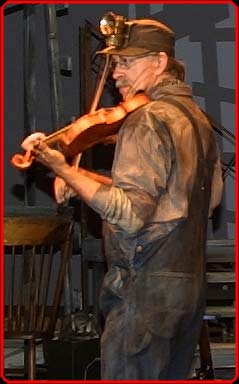
|
||
| Volume II, Issue I | Spring 2003 | |
| Spring 2003 Home Page |
| Culture, Politics & Technology |
| Fiction |
| Music |
| Poetry |
| Theater / Drama |
| About / Contact |
| Archive |
| Current Home Page |
Coal miners' daughters – and fathers, sons and brothers
|
For a guy from the Pacific Northwest, Dan Wheetman has had an inordinate impact on Southern California theater.
Which is lucky for those of us who live here, because Wheetman's great passion in life is telling the story of American music on stage. If much of the country only got hip to the joys of traditional American music with the soundtrack to "O Brother, Where Art Though," Wheetman has been immersed in it most of his adult life.
In addition to his 18 years as a member of the neotraditional folk/country combo Marley's Ghost, he has also collaborated on quite a few stage productions built around traditional American music. Among them are two with San Diego histories: "Ain't Nothin' But the Blues" (which warmed up at the San Diego REP before going on to massive acclaim and success on Broadway) and "Lost Highway," the story of Hank Williams, which had its third production here in '92 at the Globe (and in which Wheetman himself performed as a member of Williams' band).
Wheetman is back in town, handling the musical aspects (song selection, arrangements) for and performing in Randal Myler's new production, "Fire On the Mountain," a look at the lives of Appalachian coal miners. "Fire" is currently in its world premiere at the REP (running through the first week of June).
 Dan Wheetman in "Fire on the Mountain" |
"The songs in 'Fire' are mostly traditional, written by the miners with a few newer tunes that help tell the story. The 'spoken word' is also taken from the miners themselves, from interviews and newspapers. Randy spent some time calling old miners and getting them to talk about the life in the mines and the world around them."
Wheetman wrote that he first met Myler during a national touring production of the musical play "Quilters" (written by Molly Newman and Barbara Damashek), which was a look at American pioneer women illustrated with traditional music. That role lead Myler to hire Wheetman for a production of "Pearly" in Denver — where the creative team that would produce "Blues" came together.
"The lead female (in 'Pearly') was Deborah Sharpe, who was married to Ron Taylor," Wheetman explained. It was Myler, Wheetman, Taylor, Charles Bevel and Lita Gaithers — also in "Pearly" — who would go on to write "Ain't Nothin' But the Blues."
Before then, though, Wheetman was also indirectly involved with getting San Dieagans their first glimpse of bluesman Keb' Mo' as a blues guitarist in the Globe's production of "Lost Highway":
"Meeting Ron Taylor (during 'Pearly'), Randy cast him as Tee Tot in 'Lost Highway' in Denver. We moved the production to the Mark Taper in L.A. and then in '92 it came to the Globe. The fellow who had done the Taper, Chic Street Man, couldn't do the Globe (so) he recommended a friend, an L.A. musician named Kevin Moore who was just getting into rural blues ...you know the rest of the story."
Wheetman said all the shows he's worked on have a common thread:
"They all deal with the Heart of America, with a musical voice that truly informs us of who we are and where we came from. I'm not someone who wants to freeze time and I don't believe we are going to Hell in a hand basket (hard to see that sometimes ...), but I do believe we tend to 'dispose' of our past instead of embracing it."
![]()
Spring 2003 Theater Section | Spring 2003 Main Page
Current Theater Section | Current Home Page
Copyright © Turbula.net